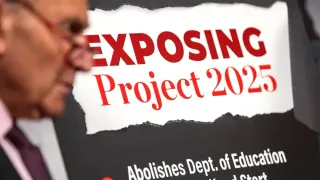September 26, 2015
In US, Pope's Appeal Transcends Religion, Age, Politics
Jocelyn Noveck READ TIME: 3 MIN.
Humble. Understanding. Genuine. Empathetic. Those words have been repeated frequently this week to describe Pope Francis.
For Rabbi David Ingber, there was another key adjective.
"He's the tender pope," said Ingber, who leads the Kehilat Romemu congregation on the Upper West Side of New York City, where he was moved to mention the pope's visit during Yom Kippur services. "He's 78 years old and he has been tenderized, not hardened, by life. ... His heart is wide open. His smile seems warm and genuine. He feels approachable and real. He's walking his talk. He's off script, dictated by what's in his heart."
"The people with power," Ingber added, "are usually the ones who are NOT tender. But look what is happening: It's a revolution of tenderness," he said, referencing the pontiff's closing words in Cuba, his stop before the United States.
Pope Francis, on his first ever visit to the United States, has captivated many Americans, often regardless of their faith, background or age. The reasons are many: from being touched by some of his signature gestures of kindness - such as popping out of his car at the airport to bless a boy in a wheelchair, as he did Saturday in Philadelphia - to delivering messages that resonate across religions, or for people who identify with no religion.
Umit Celebi is one of the many Americans - an estimated quarter of the population - who say they don't have ties to organized religion. He disagrees with the pope's position on issues like gay marriage and abortion. But the New York City actor was thrilled, nonetheless, by a chance encounter he experienced with the man many call the "rock star pope." Leaving his apartment Friday morning to grab a coffee at Starbucks, he suddenly found himself standing in a clump of a few people just as the pope's Fiat turned up the street where he lives, on its way to ground zero.
"The window was open, and he looked right at us," Celebi said. "He was smiling. There was definitely eye contact."
Celebi said he admires the pope as a man who clearly understands his position.
"Whether you're a believer or not, it's always important to see someone who is 24 hours on the message," Celebi explained. "And his message is, as the world gets richer, don't forget about the poor! And he's coming here and saying this in a country where some people see poverty as a moral failing."
Another word that comes up often: authentic.
"People really believe that this is him," said Phillip Thompson, executive director of the Aquinas Center of Theology at Emory University. "In a world that's so cynical, where we're constantly bombarded by falsity, we're seeing someone authentic - and this is not new for him. He's been this way his entire adult life."
At a panel at his center Thursday night, Thompson said, a number of people mentioned that the pope's speech to Congress had made them cry. "When you touch people so deeply in the heart, you've really done something," Thompson said.
He also noted the pope had been direct but not confrontational. "He didn't softball on some serious issues, like the death penalty," Thompson said. "But in this era of so much anger, he speaks from a position of friendship and love - and integrity. That's different."
Many have noted that Francis appeals to all ages. On Friday, two 16-year-olds were inside the Madison Square Garden Mass while the adults who accompanied them stood outside. There were only two tickets, and the kids got them.
"My daughter is very moved by him," said Aimee Skiff of Cairo, New York, whose daughter, Morgan, was inside with a friend. "It's wonderful that he can draw in the youth. Our priest felt it was important for the youth to have this opportunity."
Skiff's friend, Barbara Koerner-Fox, tried to put into words why this pope is so popular.
"He just seems so caring and generous," she said. "You know, I can't say exactly what. He's just ... very different."






